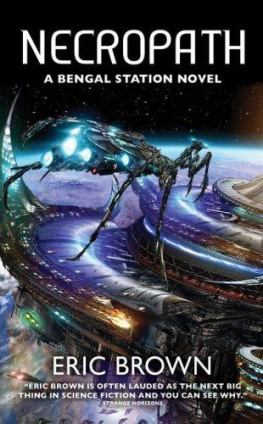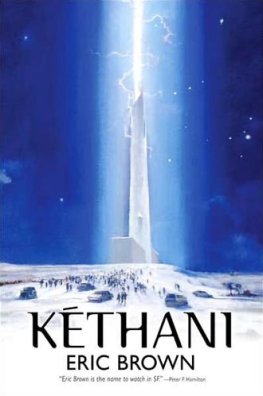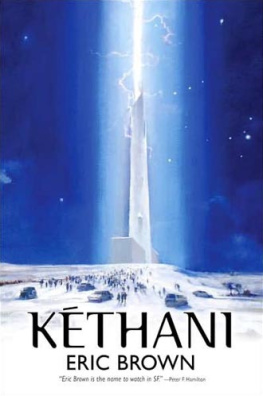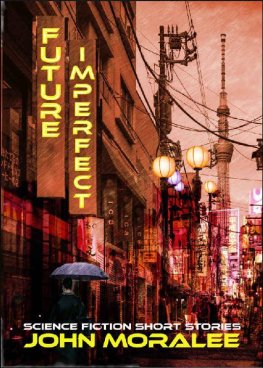Necropath
Bengal Station Book 1
By Eric Brown
ONE : SINS AND EVILS
Vaughan was in scan-mode when the kid found him.
He leaned against the enclosure rail and stareddown at the Bay of Bengal a kilometre below. A dhow cut a sharks-finshape through the darkness, its triangular sail illuminated by thewatch-light burning on the deck. The crew, three fishermen from theslums of the lowest level, appeared silhouetted behind the canvaslike figures in an Indonesian shadow play. Vaughan sensed theirminds, a tangle of thoughts and memories that impinged upon hisconsciousness in waves of words and images, too weak andimpressionistic at this distance to cause him distress.
As the dhow passed from sight beneath the faadeof the Station, to dock at the burning ghats far below, Vaughanlooked towards the horizon. To the west, over India, constellationsrose in the indigo expanse of the hot night sky. Many of the starsharboured inhabited worlds, planets settled from Earth or occupied bysentient alien species but they appeared tonight as they hadfor aeons: bright points of light scintillating in the interstellardarkness. As hard as it was to envisage life teeming beneath thosedistant suns, so it was almost impossible to imagine the manyvoidships vectoring in on Earth from all over the galaxy. The proofof their arrival, if he needed any, was here to see. He turned andnarrowed his eyes against the halogen brightness of the spaceport. Adozen ships of all sizes occupied the docking berths across the fivesquare kilometres of the port, and many more were garagedinstorage or undergoing repairson the deck below. On the otherside of the port, arrivals and departures came and went withmuffled thunder and strobing flight lights, moving like burdenedbehemoths from the Station and out over the bay. There theynegotiated the phase shift into the void with the visual equivalentof a stutter and vanished in utter silence as if they had neverexisted. Watching their departures, he often wondered if he had madethe right decision; perhaps he should have run off-world years ago ashis head had told him, and not listened to his heart, his instinct,which had counselled him to remain on Earth.
A hundred metres across the deck, the Prideof Xerxes was secure in its berth, thecaptive of a hundred magnetic grabs and grapplesa monstrouspraying mantis fashioned from grey steel, its company coloursexcoriated by passage through the void. To complete the image of acaptured insect, a dozen engineers swarmed over its carapace liketiny predators.
Five years ago, when Vaughan arrived at theStation, hed found something thrilling about these vastinterstellar ships. But familiarity had fostered, if not contempt,then certainly apathy. There had been a time when he looked forwardto his shift aboard a ship, curious about its make and originsevencurious about the mindset of the disembarking colonists. Therepetition of the years, though, the incessant scanning of minds thatdisplayed the same old set of human sins and evils, now made everyshift a test of endurance.
For three hours at the beginning of this stintVaughan had mingled with the crew in the exit foyer of the Xerxes,scanning the minds of the weary travellers for evidence of crimeaforethought, the give-away guilt of illegal immigrants. For the mostpart he had merely skimmed the surfaces of the passing minds,reluctant to delve too deeply into the neuroses, psychoses and othermental aberrations of his fellow man. From time to time, detecting aflash of ill intent, he had probed furtherbut this shift hehad discovered nothing more than the usual array of hatred, anger,and self-loathing.
When the ship had emptied, hed taken histeam through every deck in search of stowaways, scanning for thetelltale cerebral signature of frightened free-riders. As ever he hadhurried ahead of his six-man cadre, not wanting to eavesdrop on thethought processes of the men in his command. Hed known thesesecurity guards too long, too well, and what passed for intellectionwithin the confines of their skullstheir shallow hopes anddesires, their suspicion and even dislike of himhe foundalmost unbearable. He recalled the words of a fellow psi-positive atthe Institute twenty years ago, "Prepare yourself for a lonelylife. No one likes a telepath." Well, hed not expectedmuch from anyone even then, and his experience after the cut hadmerely confirmed his assumptions about life, humankind and theuniverse. Whenever he found himself loathing his current job, hereminded himself that it could be, and had been, much worse.
The Pride of Xerxeshad proved clean, and Vaughan had hurriedly quit the ship and crossedthe deck to the rail, to be alone with his own thoughts for a while.With luck, he would have no more ships to board today: if there wereany arrivals in his sector, Weiss would hail him on his handset soonenough. Going by the book, Vaughan should seek out Weiss to report onthe Xerxes andreceive further duty instructions, but Weiss could wait. Hedreport in three hours when his shift was almost over.
He often sought escape in this sector of theport. The perimeter deck was cantilevered way out over theocean, and so in theory, and often in practice, the most sequesteredarea of the entire spaceport. Here, the minds of the twenty-fivemillion citizens of the Station were modulated to a manageable,low-level hum. If his personal space was invaded, either by thearrival of a ship or the passing of an engineering team, and he wasbesieged by the manic static of skull-chatter, he would slip theaugmentation-pin from the console at the back of his head. Then, themillions of minds would be modulated to background noise, and thoseclose at hand in the port would be muted, an unreadable fugueof mind-sound he likened to music played far off.
The city that sprawled across the upper-deck ofthe Station was invisible behind the halation of lights that bathedthe deck in a silver-white glow. Beyond the port, the city wasa patchwork of residential apartments, hotels, parks, and gardens,shot through with long roads and pedestrian walkways. Bengal Stationwas a cultural amalgam of Calcutta and Bangkok: on the upper-deck thelatest polycarbon architecture designed in India and Thailand createda state-of-the art skyline, while overhead fliers machd alongcolour-coded air corridors.
The nineteen levels below were enclosed, eachshelf a claustrophobic hive-city of corridors, walkways, and roadsbetween cramped, two-storey structures, inhabited by citizens whonever saw the light of day for years on end. Over the years adefinite hierarchy had stamped itself on the Station, with the lower,industrial decks inhabited by the poor, while the upper levels werethe preserve of the rich and influential. Vaughan supposed that inthis it was like most cities, except that here the divisions wereemphasised by the literal stratification of society.
The culture shock that hit all new arrivals wasthat such disparity could exist in such close proximity; later, aftera week or so, amazement turned to indignation that wealth and povertycould commingle without reaction, like oil and water. If thetraveller stayed long enough, he found himself accepting thesituation with the same resigned apathy as the citizens of theStation. Vaughan had arrived here in 35 with no plans to stayabove a day or two, but that day or two had stretched to a month,then three months, and hed found himself adapting to the wayof life, by turns appalled and fascinated, accepted by the locals ifhe in turn was willing to accept. After six months it came to himthat the Station was the ideal place to go to earth, and he had foundemployment, an expensive sea-view apartment on the fourth level, andslipped into a routine of work, sleep, and occasional drunkenbingesa present without a discernible future, haunted by thespectres of the past.
Vaughan watched a cow shamble beneath the greatprow of the
Next page















